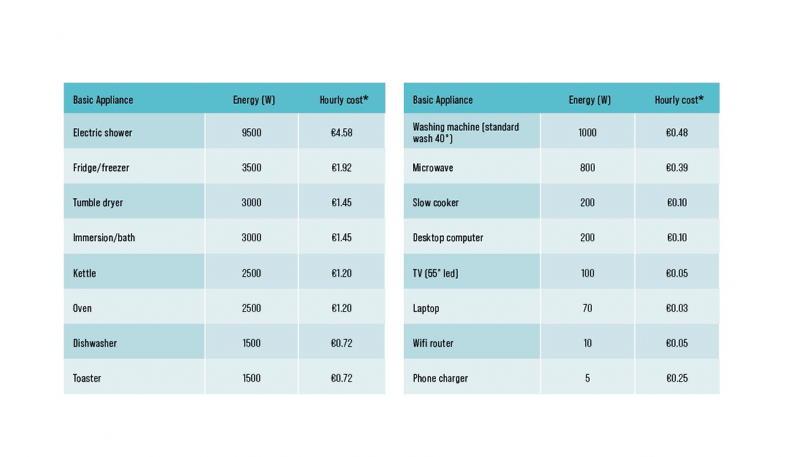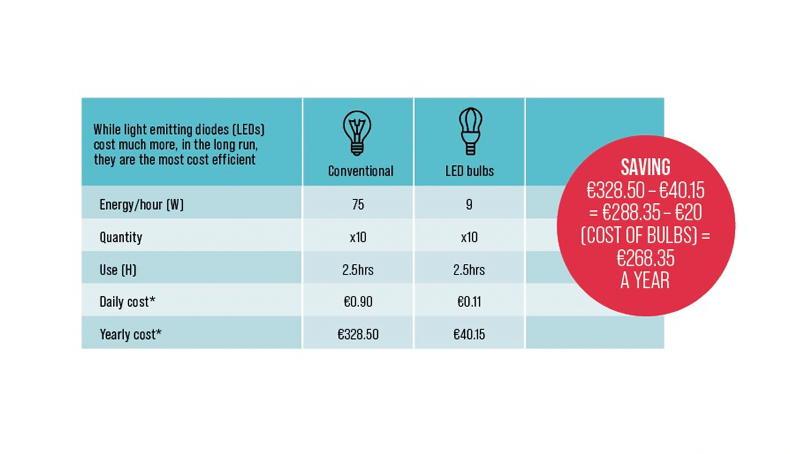The residential sector accounts for about one quarter of the energy used in Ireland. With the ?war in Ukraine and the cost-of-living crisis home owners are seeing the highest ever spike in electricity prices. The Commission for Regulation of Utilities (CRU) states that the average Irish household (using gas and electricity for energy) uses 4,200 kW/h of electricity and 11,000 kW/h of gas per year. According to switcher.ie the average annual electricity bill on a standard tariff is €2,120 if you live in a typical three-bedroomed house. It is important to shop around as switching energy suppliers could save you €300 a year. The Sustainable Energy Authority of Ireland (SEAI) published its annual Energy in Ireland report in December, which shows that Ireland’s energy-related CO2 emissions increased by 5.4% in 2021. Reducing our use has never been so important.
In the 2023 budget, the Electricity Costs Emergency Benefit Scheme II was announced as a support credit to offset the impact of rising energy costs. Domestic electricity customers will get €600 credit to help reduce the cost of their electricity bills. By now most of us have seen one of these payments coming through in the first of three €200 installments.The second and third electricity credit will be made from January to March 2023.
FIve tips for reducing your electricity usage
1. Use your appliances sensibly
Appliances are the biggest energy user, in particular the shower, cooker, dryer and washing machine. It is advised to run your dishwasher and washing machine at a lower temperature setting to save energy costs. Avoid using your larger appliances during the peak hours of 7-9am and 5-7pm. Don’t leave the fridge door open for too long while getting food. For every 10–20 seconds the door is open, it takes 45 minutes for the fridge to cool down to its original temperature. Heated clothes airers can be a good compromise for dryers on winter days – they cost about 14c per hour to run and you’ll get the benefit of the residual heat.
2. Hot water
According to Bord Gáis Energy, if you cut your shower time down by three minutes, you could save €83 a year. A shower typically uses 20% of the energy compared to a full bath, so have showers where possible. Set your hot water thermostat to between 60-65 degrees, ensuring you’re not over heating your water. 
3. Heating
You could be losing 25% of your home’s heat through your roof alone. A good long-term way of saving electricity is installing additional attic and wall insulation. According to the Sustainable Energy Authority of Ireland (SEAI) you can reduce your heating bill by 10% by lowering your room temperature by one or two degrees. Set a timer to ensure your heating only comes on at points in the day you are home and when you need it.

Basic appliance energy consumption
4. Energy Monitor
Installing an energy monitor will allow you to see how much electricity you are using in real time. It will allow you to monitor your usage before you get an unexpectedly large bill through your letter box. It will also encourage you to reduce the amount of electricity you are using when you can monitor it in real time. By the end of 2024, every home and business in Ireland will have a smart meter.

Lighting energy consumption
5. Lighting
Turn lights and switches off when you leave a room. Use natural lighting during the day to avoid turning light switches on. Switching your light-bulbs to LED could save you €286 a year. They are 85% more energy efficient, have a longer lifespan and are more environmentally friendly than standard light-bulbs.
If you are having trouble paying electricity or gas bills please speak to the Commissions for Regulation of Utilities (CRU). It is essential to know your rights as a consumer and review your supplier’s Codes of Practice, ensuring you are aware of the standard of service you are entitled to.
The residential sector accounts for about one quarter of the energy used in Ireland. With the ?war in Ukraine and the cost-of-living crisis home owners are seeing the highest ever spike in electricity prices. The Commission for Regulation of Utilities (CRU) states that the average Irish household (using gas and electricity for energy) uses 4,200 kW/h of electricity and 11,000 kW/h of gas per year. According to switcher.ie the average annual electricity bill on a standard tariff is €2,120 if you live in a typical three-bedroomed house. It is important to shop around as switching energy suppliers could save you €300 a year. The Sustainable Energy Authority of Ireland (SEAI) published its annual Energy in Ireland report in December, which shows that Ireland’s energy-related CO2 emissions increased by 5.4% in 2021. Reducing our use has never been so important.
In the 2023 budget, the Electricity Costs Emergency Benefit Scheme II was announced as a support credit to offset the impact of rising energy costs. Domestic electricity customers will get €600 credit to help reduce the cost of their electricity bills. By now most of us have seen one of these payments coming through in the first of three €200 installments.The second and third electricity credit will be made from January to March 2023.
FIve tips for reducing your electricity usage
1. Use your appliances sensibly
Appliances are the biggest energy user, in particular the shower, cooker, dryer and washing machine. It is advised to run your dishwasher and washing machine at a lower temperature setting to save energy costs. Avoid using your larger appliances during the peak hours of 7-9am and 5-7pm. Don’t leave the fridge door open for too long while getting food. For every 10–20 seconds the door is open, it takes 45 minutes for the fridge to cool down to its original temperature. Heated clothes airers can be a good compromise for dryers on winter days – they cost about 14c per hour to run and you’ll get the benefit of the residual heat.
2. Hot water
According to Bord Gáis Energy, if you cut your shower time down by three minutes, you could save €83 a year. A shower typically uses 20% of the energy compared to a full bath, so have showers where possible. Set your hot water thermostat to between 60-65 degrees, ensuring you’re not over heating your water. 
3. Heating
You could be losing 25% of your home’s heat through your roof alone. A good long-term way of saving electricity is installing additional attic and wall insulation. According to the Sustainable Energy Authority of Ireland (SEAI) you can reduce your heating bill by 10% by lowering your room temperature by one or two degrees. Set a timer to ensure your heating only comes on at points in the day you are home and when you need it.

Basic appliance energy consumption
4. Energy Monitor
Installing an energy monitor will allow you to see how much electricity you are using in real time. It will allow you to monitor your usage before you get an unexpectedly large bill through your letter box. It will also encourage you to reduce the amount of electricity you are using when you can monitor it in real time. By the end of 2024, every home and business in Ireland will have a smart meter.

Lighting energy consumption
5. Lighting
Turn lights and switches off when you leave a room. Use natural lighting during the day to avoid turning light switches on. Switching your light-bulbs to LED could save you €286 a year. They are 85% more energy efficient, have a longer lifespan and are more environmentally friendly than standard light-bulbs.
If you are having trouble paying electricity or gas bills please speak to the Commissions for Regulation of Utilities (CRU). It is essential to know your rights as a consumer and review your supplier’s Codes of Practice, ensuring you are aware of the standard of service you are entitled to.









 This is a subscriber-only article
This is a subscriber-only article










SHARING OPTIONS: